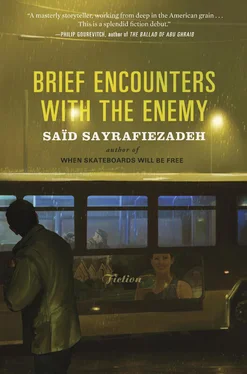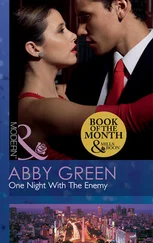Poof .
The boy fell right where he stood, he fell straight down as if he were melting into the ground in a puddle of blood. Once he’d fallen, he didn’t stir. Only the man was moving now, struggling to push himself up, but it was obvious that he had no strength. Eventually he stopped altogether and just lay on the ground as if he were napping. The pool of blood spread out and ran into the high grass.
I stood there for a while. It was beginning to get dark. It was 7:53. Back home, it was the other 7:53. A few minutes later, the prairie was immersed in a dark gray light and I could hardly see anything. The only sound was the buzzing of the flies.
I turned and went back down the hill, the last time I’d be going down the hill, and then I went across the bridge and along the path. My gun and backpack banged against the solid wall of trees. It was almost completely dark, and in the dark I could hear my father saying, over and over, “What have you been doing, Luke? What have you been doing for the last two or three hours?”
Nothing. I’ve done nothing.
The next day we flew back home in style, just like we’d been promised.
It was cool weather when I returned. Cool, breezy, overcast, but no rain. I had departed in cool weather too. So in some ways it was as if nothing had changed.
What had changed was that I was a hero, coming home to great fanfare — me and one thousand other guys. We were lucky to have been included in the first wave back. This was when the news was fresh, when everyone was excited. Just like that, the war had ended. No one had seen it coming and everyone was thankful. The diplomacy had been a success, the enemy had capitulated, and all the terms of the settlement were in our favor. Everyone said it had been worth it. Everyone said they’d do it all over again.
Underneath a gray and cloudy sky, the boulevard was lined with ten thousand people who had come out to greet us, ten thousand people screaming their heads off like we were a rock band being pulled by in a flatbed truck. “We love you,” they shouted generally. “We love you too,” we shouted back. We smelled like sweat and mildew and fatigue. Some of us smelled like vomit. It had been a long trip home: a boat, a train, a plane. On the final flight we’d had to hold our duffel bags on our laps with the air vents blowing warm air on the tops of our heads, but no one complained, no one said a word, we were all happy to have made it out alive.
My mother had said she’d come out to cheer for me. She’d bought a big sign custom-made at Walmart. WELCOME HOME JAKE, it read. She showed it to me later, unfurling it on top of her bed because her place was small and there was nowhere else to put it. She was surprised I hadn’t been able to pick it out of the crowd. I was touched, but she was disappointed. “I was so sure you’d see it!” I tried to let her down easy. “It was a sea of people, Ma,” I said. A sea of flags and signs and waving hands. The fact was, I hadn’t even thought to look for her. I’d forgotten about her, actually. Instead, I’d been searching the crowd for Molly. It had been eighteen months since I’d seen her. Eighteen months of emails filled with declarations of love, declarations of what might have been and what might be. We knew our relationship would probably never amount to anything, but still we dreamed. Fifteen thousand miles away from each other, we waxed poetic and romantic, and sometimes we sent naked pictures. The last email I’d received had been three days earlier, four-thirty in the morning Molly’s time, letting me know that she was coming to the homecoming, honey, that she wouldn’t miss it for the world, that she was bringing Lola. Lola wouldn’t miss it for the world. And by the way, she’d attached a drawing she’d made that night, that very night, three people in watercolor, presumably the three of us, all pinks and purples and shadows. The girls wore skirts and I wore camouflage. What did I think? she wanted to know. It wasn’t what I had dressed like, but it was well done. “It’s beautiful,” I wrote back.
“Do you really mean that?” she responded. She had confidence issues.
As the flatbed truck moved slowly down the boulevard, I jostled with the other guys for that prime position front and center. Every so often I would think I’d hear her in the crowd, yelling, “Jake, Jake,” and I’d wave my arms in the direction of her voice, and I’d jump up and down as if I’d won a big prize. But there was no one yelling “Jake, Jake,” they were yelling “Hey, hey” to all of us. Still, I stood front and center. “Come on, Jake,” the guys said. “Give someone else a chance.” But I was selfish and wouldn’t budge. I’d earned the right. I’d trained harder, marched longer, fought better. The guys would have said so themselves. Plus I’d saved a few of their lives along the way. But the peace was upon us now. “It’s every man for himself,” I told them. It was a wonder how quickly the sense of camaraderie could evaporate.
Far out over the heads of the ten thousand fans, I could see the factories sending up their plumes of smoke into the overcast sky. You couldn’t distinguish the gray smoke from the gray sky. For as long as I’d been gone, the factories hadn’t stopped once. Twenty-four hours a day, seven days a week, the smokestacks churned. “I’m going to get a job down there,” one of the guys said. Brad. He wasn’t speaking to me, he was speaking at large. “Good luck,” I told him. He needed luck. It was a fact that half the guys were going down to the factories first thing in the morning to put in an application. Everyone had a plan, and that was their plan. As for me, I didn’t have a plan. I didn’t need one. I was coming home to a good job, secure and with full benefits, teaching sixth-grade history at the best school in the city. Montgomery Prep. On Monday morning I would show up bright and early in my tie and briefcase, as if nothing had changed, as if I’d never left, and I would say, “Good morning, boys and girls …” And they’d want to know all about where I’d been and what I’d done and what I’d seen. But there would be schoolwork to undertake. And schoolwork came first. They’d be studying the Renaissance by now. Or if the substitute teacher had been inept and inefficient, which I suspected she had been, they would have made it only as far as the Middle Ages. Or worse, the Holy Roman Empire. It didn’t matter to me. I was happy to get back to any era.
Eighteen months earlier, I’d had to abandon another class of sixth-graders unexpectedly, unhappily, midterm — Han Dynasty — with only three days’ notice. They’d gathered around and hugged me goodbye. They’d said, “We’re going to miss you, Mr. Mattingly!” I tried to be reassuring, but all I could think about was what terror lay in store for me. Everyone thought I was a hero, teachers included, but the reality was I had no choice in the matter, it was the deal I had struck in exchange for my college degree when I’d had the forethought, two weeks out of high school, to go down to the Career Center and sign up. I didn’t want to end up like my mother, working as a telephone operator for thirty years. The recruiter had told me they’d need me one weekend a month unless there was a war. “But there ain’t going to be no war,” he’d said. He had laughed. We both had laughed. I’d signed on the dotted line and then gone straight down to Peabody Community College to register for fall classes — all paid in full by that one weekend a month. It had seemed comical back then, the idea of a war. It had seemed antiquated. Three years later it wasn’t antiquated anymore, and three years after that my number had come up. Now this trip down the boulevard, with the flags waving, with the crowd screaming, represented my final remittance.
Читать дальше












